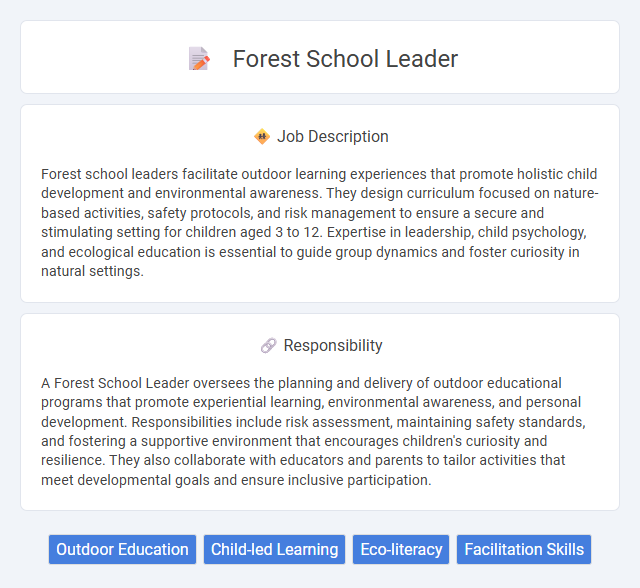
Forest school leaders facilitate outdoor learning experiences that promote holistic child development and environmental awareness. They design curriculum focused on nature-based activities, safety protocols, and risk management to ensure a secure and stimulating setting for children aged 3 to 12. Expertise in leadership, child psychology, and ecological education is essential to guide group dynamics and foster curiosity in natural settings.
Individuals who are patient, adaptable, and passionate about outdoor education are likely to thrive as Forest School Leaders, as the role demands strong interpersonal skills and the ability to engage children in nature-based learning. Those who enjoy working in varied weather conditions and possess physical stamina might find this career particularly suitable, given the outdoor and sometimes physically demanding environment. Candidates lacking patience or a genuine interest in environmental education may find the role challenging and less fulfilling.
Qualification
A Forest School Leader holds a Level 3 Forest School Leader qualification accredited by the Forest School Association, ensuring expertise in outdoor learning and child development. This certification includes comprehensive training in risk assessment, group management, and environmental education, vital for facilitating safe, engaging nature-based activities. Candidates often require experience in early years or primary education, alongside strong communication and leadership skills to effectively guide diverse groups in outdoor settings.
Responsibility
A Forest School Leader oversees the planning and delivery of outdoor educational programs that promote experiential learning, environmental awareness, and personal development. Responsibilities include risk assessment, maintaining safety standards, and fostering a supportive environment that encourages children's curiosity and resilience. They also collaborate with educators and parents to tailor activities that meet developmental goals and ensure inclusive participation.
Benefit
Forest school leader roles likely provide significant benefits, including opportunities to foster children's development through outdoor experiential learning. There is a high probability that leaders gain valuable skills in environmental education, team management, and child psychology. This position often enhances well-being due to regular exposure to nature and promotes sustainable practices in education.
Challenge
Forest school leader roles probably involve managing unpredictable outdoor environments, which can challenge lesson planning and safety protocols. Leading diverse groups of children may require adaptable communication and problem-solving skills to address varying needs and behaviors. This position likely demands resilience and creativity to foster a positive learning atmosphere despite weather conditions and resource limitations.
Career Advancement
A Forest School leader role offers significant career advancement opportunities within outdoor education and early childhood development sectors. Professionals gain expertise in environmental pedagogy, leadership skills, and curriculum design, positioning themselves for senior educational roles or specialized training positions. Continuous professional development and certification enhance prospects for managing multiple programs or transitioning into educational consultancy.
Key Terms
Outdoor Education
A Forest School Leader specializes in delivering outdoor education programs that foster children's development through hands-on learning in natural environments. They design safe, engaging activities that promote confidence, teamwork, and environmental awareness while adhering to health and safety regulations. Expertise in risk assessment, child protection, and nature-based pedagogy is essential for effective leadership in Forest School settings.
Child-led Learning
A Forest School leader facilitates child-led learning by creating an outdoor environment that encourages exploration, creativity, and independence. They observe children's interests and guide activities that promote problem-solving, social skills, and emotional development through nature-based experiences. Emphasizing hands-on discovery, this role supports personalized learning pathways that cultivate confidence and a lifelong connection with the natural world.
Eco-literacy
A Forest School Leader specializes in outdoor education, fostering eco-literacy by teaching children and adults to understand and engage with natural ecosystems. They design and facilitate hands-on learning experiences that promote environmental awareness, sustainable practices, and a strong connection to the natural world. Expertise in outdoor safety, child development, and environmental education standards is essential for effective leadership in this role.
Facilitation Skills
Forest school leaders excel in facilitation skills by guiding children through outdoor learning experiences that foster curiosity and independence. They create safe, supportive environments that encourage exploration while managing group dynamics effectively to ensure inclusive participation. Mastery of active listening, conflict resolution, and adaptive communication techniques are essential for promoting positive social interactions and enhancing learner engagement in natural settings.
 kuljobs.com
kuljobs.com